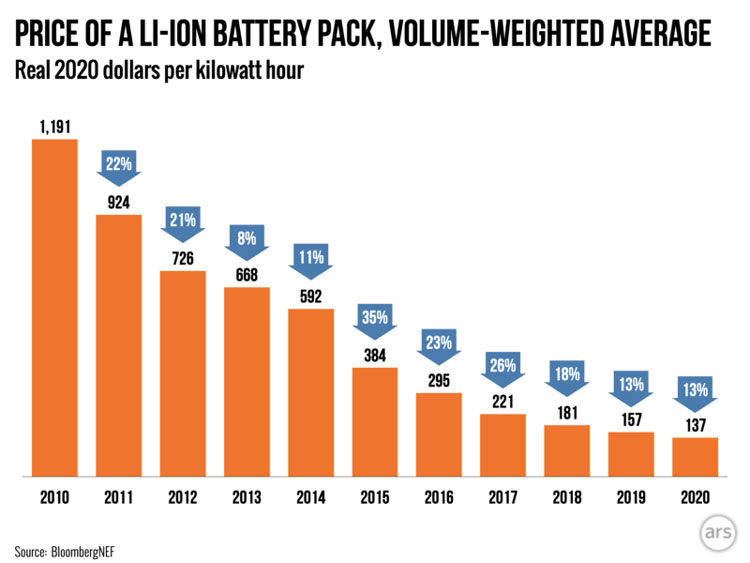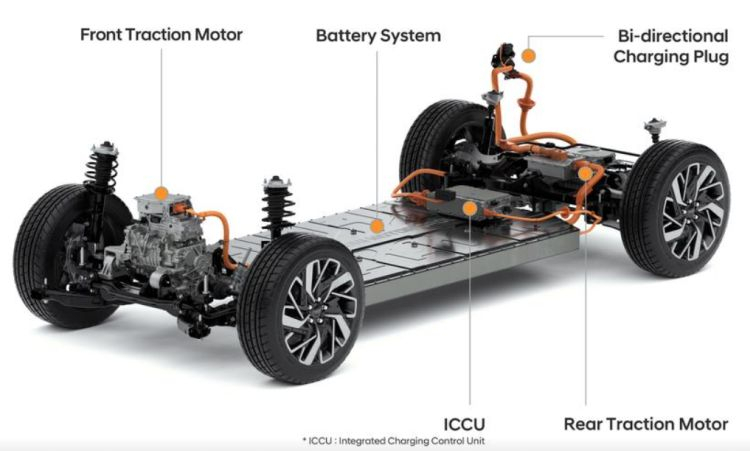We constantly complain about the lack of capacity and high cost of batteries, but over the past ten years, lithium batteries have become almost ten times cheaper. A person from 2010 would be delighted with the prices of lithium batteries in 2020. And it’s not even technology. The volume of production has grown corny. True, further the rate of decline in prices will significantly decrease, about which (and many other interesting things) says fresh analytics.
–
According to new industry research by BloombergNEF, the average cost of a lithium-ion battery in 2020 fell to $ 137 per kWh. This is a 13% decline from 2019, adjusted for inflation. The latest figures show astounding progress over the past decade in battery technology, with kit prices down 88% since 2010.
High-capacity, affordable batteries will be essential for the global economy to move away from fossil fuels. Lithium ion batteries are a key technology for electric vehicles. They are also needed to smooth out power outages in wind farms and solar panels. Until recently, all of this made little sense without substantial government subsidies and special “green” tariffs. But now everything is changing, and soon lithium-containing batteries, more precisely, the reduction in prices for them will begin to play a major role in changing trends in transport and electricity generation.

Dynamics of the decrease in average prices for lithium batteries. Image source: BloombergNEF
–
–
–
BloombergNEF estimates that by 2024 battery prices will drop to $ 100 per kWh. This is roughly the level required for subsidy-free electric vehicles to be price competitive with conventional ICE vehicles. Given that electric vehicles are cheap to charge and likely require less maintenance than a regular car, they will become an increasingly attractive option for owners over the next decade.
BloombergNEF analysts see the decisive factor in lowering prices for batteries in the expansion of production, not in technology. The more a product is produced, the cheaper it is. According to BloombergNEF estimates, the rate of decline in battery prices is about 18% after each doubling in production. So, in the period from 2010 to 2020, the production volume of lithium batteries increased 264 times! Alas, it is unlikely that it will be possible to further expand production at such a rate. Therefore, in the next decade, battery prices will decline less and less.
For example, battery prices declined 13% between 2018 and 2019 and another 13% between 2019 and 2020. But even that promises that battery prices will drop to $ 58 / kWh in 2030 and $ 44 / kWh in 2035. This is the price level when electric transport will become more attractive than usual.
All of the above figures are averaged. BloombergNEF analysts have the opportunity to say something interesting about specific companies and regions. In particular, they estimate Tesla batteries at an even lower amount than the market average, namely, $ 115 per kWh in 2020 ($ 128 per kWh in 2019). That being said, according to BloombergNEF estimates, Tesla accounted for 25% of the global electric vehicle market in 2020.

Image source: Hyundai Motor, Reuters
–
–
–
But China is the leader in everything. This country has the cheapest lithium batteries in the world, the cost of which in 2020 is below $ 100 per kWh (from some manufacturers). And no wonder. China is home to three quarters of the world’s battery manufacturing capacity, which is volume and competitive prices.
Interestingly, the world’s lowest prices were for large battery packs used in Chinese electric buses and commercial trucks. The average battery kit price for these Chinese cars was $ 105 per kWh, compared to $ 329 for electric buses and commercial vehicles in the rest of the world. This was a consequence of the policy of the authorities, which are actively developing the production of commercial electric transport and the infrastructure for its operation. Everyone else can only envy and take an example from effective initiatives.
–
If you notice an error, select it with the mouse and press CTRL + ENTER.


